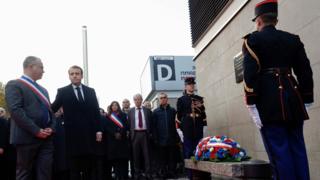Macron honours victims of Paris jihadist attacks
French President Emmanuel Macron is honouring victims of the Paris terror attacks of 2015 as a key jihadist's silence frustrates investigators.
A suicide bombing and mass shootings killed 130 people and wounded hundreds.
The only jihadist suspect to have survived the night of carnage, Salah Abdeslam, is being held in solitary confinement and is on suicide watch.
He is believed to have handled logistics for the group which attacked a stadium, cafés and a nightclub.
But French media report that he has only spoken once, sticking to his right to silence, despite having faced judges six times.
Investigators say the dossier against him may not be completed until the spring of 2019, French BFMTV reports.
Mr Macron is attending ceremonies at the places targeted by the jihadists, whose carnage was claimed by so-called Islamic State (IS).
The first ceremony was at the national stadium – the Stade de France – where three suicide bombers blew themselves up outside after failing to get into a France v Germany football match.
Ex-President Francois Hollande, who was at the game, is accompanying Mr Macron.
The names of other victims are being read out at the bars and restaurants where they died in 2015.
The ceremonies end at the Bataclan nightclub, where most of the victims died.
At the Bataclan, three gunmen with explosive suicide belts took hostages and killed 90 people, just after the US rock group Eagles of Death Metal had begun performing.
Dozens managed to flee when police stormed the venue to end the bloodbath.
Read more on the Paris terror attacks:
- Paris attacks: What happened on the night
- 'I met murdered Paris officer at Bataclan'
- Paris attacks: Who were the victims?
- Who would be a French cop?
Key suspect
Salah Abdeslam is under 24-hour surveillance, as a possible suicide risk, but his detention conditions have been eased slightly. An opening has been made in his cell window so that he can hear sounds from outside. And he has visitors two to four times a month – usually his mother and a brother.
At Fleury-Mérogis prison in the Paris region, he gets daily exercise alone in a yard, away from other prisoners.
French BFMTV says he spends much time scrubbing his cell, as he is apparently obsessed with cleanliness.
The French-Moroccan suspect is accused of having rented cars and arranged hideouts for the jihadists. He survived apparently because his suicide belt failed to detonate.
His older brother Brahim blew himself up outside the Comptoir Voltaire café during the attacks.
Salah Abdeslam was arrested in the Molenbeek district of Brussels in March 2016, and four days later the Belgian capital was hit by jihadist terror attacks.
- Paris suspect 'worth his weight in gold'
- Who were the Paris attackers?
Investigators have found links between him and the Brussels jihadists.
France is expected to transfer him to Belgium temporarily on 18 December to face judges there, as he is accused of attempted murder. He says he is ready to testify in Belgium in the case. It relates to a shootout with Belgian police in Forest – a district of Brussels – three days before his capture.
Police under pressure
Since the attacks, France has passed more stringent anti-terror laws, giving police wider powers to search properties, monitor suspects and shut mosques implicated in jihadist propaganda.
The new measures enabled President Macron to end the state of emergency imposed in 2015, but soldiers and armed police remain a common sight routinely guarding potential targets.
There are fears that many of the French-born IS fighters may seek to return, after IS losses of territory in Iraq and Syria.
The intensification of anti-terror duties has contributed to greater stress in the police force.
Interior Minister Gérard Collomb said more preventive work was needed to tackle suicides among police officers, which have risen compared with last year.
Six police officers killed themselves last week and the total for this year stands at 44 police and 16 paramilitary gendarmes.

